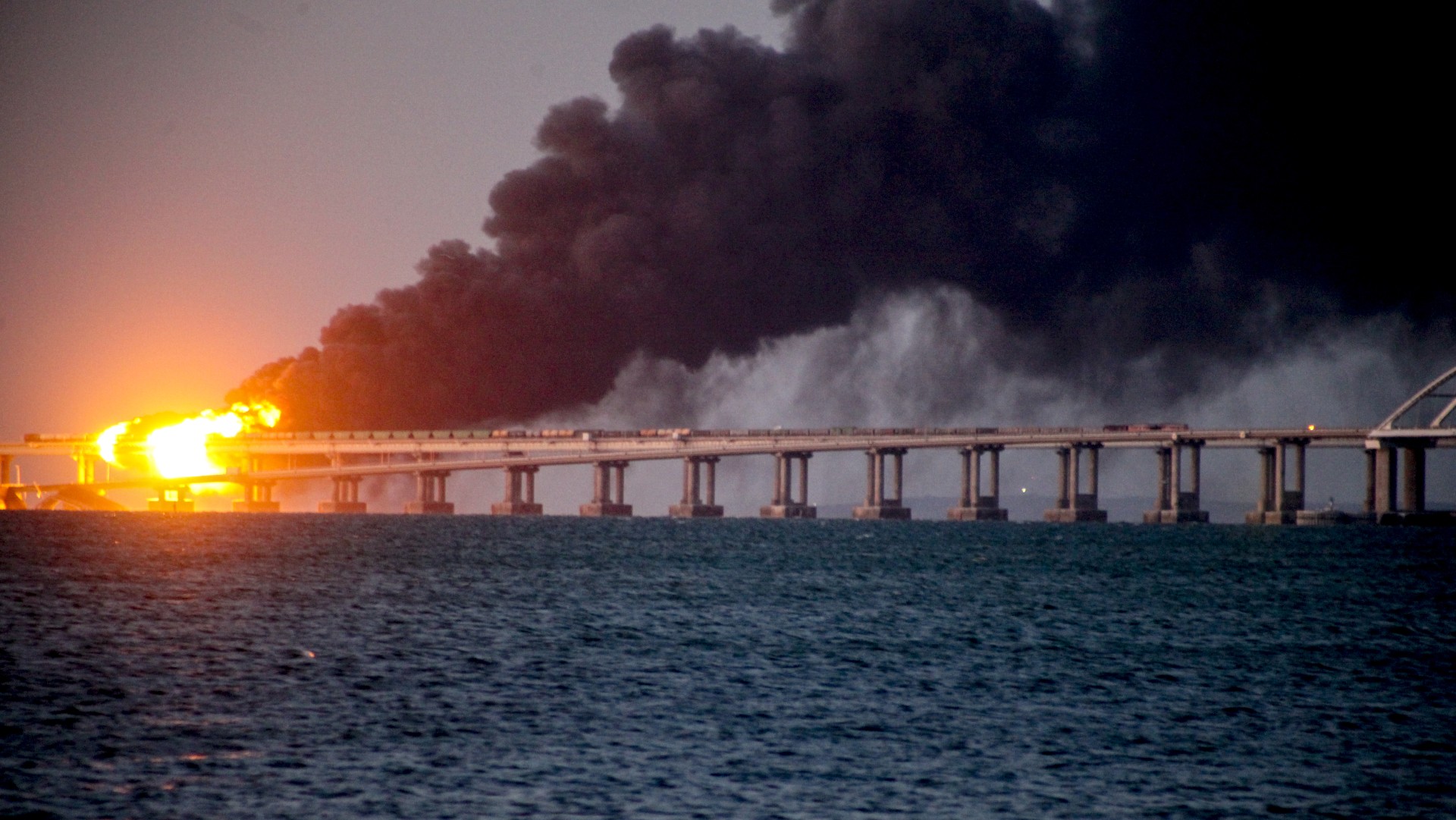Two dead in Crimea bridge attack as Russia halts Ukraine grain deal
Moscow pulls out of landmark UN agreement in response to ‘terrorist’ incident

A free daily email with the biggest news stories of the day – and the best features from TheWeek.com
You are now subscribed
Your newsletter sign-up was successful
A Ukrainian official has claimed responsibility for an attack on the main bridge linking Russia to the Crimean peninsula that left two people dead and their daughter wounded.
Russia was quick to label the incident a terrorist attack on what Reuters described as “a major artery” for Russian troops fighting in Ukraine and a “prestige project” personally opened by President Vladimir Putin in 2018, said The Independent.
The 12-mile Kerch bridge, the longest in Europe and which carries both road and rail traffic, “holds huge strategic and symbolic importance for Moscow”, said CNN.
The Week
Escape your echo chamber. Get the facts behind the news, plus analysis from multiple perspectives.

Sign up for The Week's Free Newsletters
From our morning news briefing to a weekly Good News Newsletter, get the best of The Week delivered directly to your inbox.
From our morning news briefing to a weekly Good News Newsletter, get the best of The Week delivered directly to your inbox.
A source in Ukraine’s security service (SBU) told the news network that the attack early this morning was a joint operation between the SBU and the country’s naval forces.
The governor of Russia’s Belgorod region, Vyacheslav Gladkov, confirmed that two people had been killed when the car they were travelling in was hit, while their daughter was also injured.
It is not the first time the bridge has been targeted. Last October, a huge blast partially damaged the crossing, causing parts of it to collapse. At the time Ukraine denied direct involvement, although officials have since argued the structure represents a legitimate target because of its vital logistical role in the Kremlin’s war effort.
Even before the Ukrainian official claimed responsibility for the latest attack, Russia announced it was pausing its participation in a landmark UN agreement that allowed Ukraine to export its grain by sea despite a wartime blockade.
A free daily email with the biggest news stories of the day – and the best features from TheWeek.com
The announcement appeared to be “the most serious blow yet to a year-old agreement that had been a rare example of cooperation between the warring nations”, reported The New York Times. The deal was also seen as “essential to keeping global food prices stable”, said the paper.
Aid agencies are “bracing for the impact of the deal’s end on global food prices, which they say will hit the world’s most vulnerable in food-insecure countries the hardest”, said Politico.
-
 ‘Restaurateurs have become millionaires’
‘Restaurateurs have become millionaires’Instant Opinion Opinion, comment and editorials of the day
-
 Earth is rapidly approaching a ‘hothouse’ trajectory of warming
Earth is rapidly approaching a ‘hothouse’ trajectory of warmingThe explainer It may become impossible to fix
-
 Health insurance: Premiums soar as ACA subsidies end
Health insurance: Premiums soar as ACA subsidies endFeature 1.4 million people have dropped coverage
-
 New START: the final US-Russia nuclear treaty about to expire
New START: the final US-Russia nuclear treaty about to expireThe Explainer The last agreement between Washington and Moscow expires within weeks
-
 What would a UK deployment to Ukraine look like?
What would a UK deployment to Ukraine look like?Today's Big Question Security agreement commits British and French forces in event of ceasefire
-
 Would Europe defend Greenland from US aggression?
Would Europe defend Greenland from US aggression?Today’s Big Question ‘Mildness’ of EU pushback against Trump provocation ‘illustrates the bind Europe finds itself in’
-
 Is conscription the answer to Europe’s security woes?
Is conscription the answer to Europe’s security woes?Today's Big Question How best to boost troop numbers to deal with Russian threat is ‘prompting fierce and soul-searching debates’
-
 Trump peace deal: an offer Zelenskyy can’t refuse?
Trump peace deal: an offer Zelenskyy can’t refuse?Today’s Big Question ‘Unpalatable’ US plan may strengthen embattled Ukrainian president at home
-
 Vladimir Putin’s ‘nuclear tsunami’ missile
Vladimir Putin’s ‘nuclear tsunami’ missileThe Explainer Russian president has boasted that there is no way to intercept the new weapon
-
 The Baltic ‘bog belt’ plan to protect Europe from Russia
The Baltic ‘bog belt’ plan to protect Europe from RussiaUnder the Radar Reviving lost wetland on Nato’s eastern flank would fuse ‘two European priorities that increasingly compete for attention and funding: defence and climate’
-
 How should Nato respond to Putin’s incursions?
How should Nato respond to Putin’s incursions?Today’s big question Russia has breached Nato airspace regularly this month, and nations are primed to respond